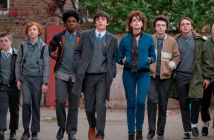
Things to Come
(dir. Mia Hansen-Løve, 2016)
L’avenir (Things to Come)
Dir. Mia Hansen-Løve
With eight French films in the official competition, most of them are co-productions, L’avenir is one among the strongest French contenders this year. Written and directed by Mia Hansen-Løve, a daughter of two philosophy professors, the French-German co-production L’avenir reflects on the intellectual and academic life of its protagonist while it explores loneliness and ageism of a middle-aged woman in a very sophisticated and comprehensible manner. Nathalie (Isabelle Hubert) is a book author and a philosophy teacher at a high school in Paris and leads a steady, seemingly perfect life. She is passionate about teaching and debating philosophy and is very dedicated in helping out her students in her spare time. She is happily married to Heinz (André Marcon) with two grown up children, the only worry in her life is her depressed and possessive mother whom she takes care of on occasion. Out of the blue, her husband announces that he will leave her for another woman and Nathalie’s previous life falls apart. Suddenly she has to reinvent her life and come to terms with her newfound freedom. When her mother passes away, Nathalie is left all by herself since her children moved out already and live their own lives. Her only companion is Pandora, her mother’s cat she had to adopt even though she suffers from allergies. It’s safe to say that she despises the cat, which creates a lot of comic relief, yet in the end she grows to love it as it is the only connection she still has to her mother. Nathalie also finds intellectual comfort in Fabien (Roman Kolinka), a former student of hers who is working on his PhD and renting out a house in the mountains with his friends and colleagues. In constant philosophical debates, Fabien, who is quite revolutionary and provocative in his ideals, confronts Nathalie and she realizes that she is not as revolutionary as she used to be and just wants to teach her students to reflect upon their own thoughts and philosophy. She remains comfortable in her middle-class, intellectual and bourgeois existence. L’avenir feels very natural, also thanks to the terrific performance by Isabelle Hubert, who plays Nathalie with a lot of dignity and gives the tragic-comical character a relate-able angle.
Quand on a 17 ans (Being 17)
Dir. André Téchiné
Director André Téchiné explores the sexual awakening between two confused teenagers in his coming-of-age drama Quand on a 17 ans. He collaborated on writing the script with Céline Sciamma, who has already dealt with adolescence as a screenwriter in her previous films Water Lilies, Tomboy and Girlhood. The story is set over three terms of a high-school year and is therefore clearly structured in its three acts, in which the characters undergo the desired character-development. Damien (Kacey Mottet Klein) and Tom (Corentin Fila) attend the same class, but have nothing in common and avoid each other. In fact, both of them are outsiders but the two teens couldn’t be any more different from one another. Tom was adopted by a caring family who own a farm in the mountains. He is quiet, strong and keeps to himself. In order to go to school, he completes a 3-hour round-trip every day, whereas Damien is getting dropped off school every morning and is generally taken very good care of by his mother Marianne (Sandrine Kiberlain) while his father Nathan (Alexis Loret) is off duty abroad as an army pilot. Annoyed by Damien’s know-it-all behavior, at least that’s what it seems like it to Tom, Tom suddenly starts to bully him at school. When Marianne, who is working as a doctor, is visiting his parent’s farm to treat his sick mother, she starts to feel responsible for the boy and offers him to stay at her place while his mother has to be hospitalized for further treatment. That would also give him more time to concentrate on his studies to improve his grades for his upcoming graduation. Reluctant at first, Tom agrees to move in with Damien’s family which causes a lot of conflict between the two teens. Since both of them are unable to express their emotions in words, they act on a physical level. Quand on a 17 ans is therefore a very physical film with a lot of fighting scenes. It’s core themes reflect on Tom’s and Damien’s coming-of-age, pushing them to explore and accept their sexuality in order to come to terms with their own identity. At first, both, Tom and Damien, are confused teenagers who don’t know who they are as individuals but through the course of the film they slowly grow conscious of it. The violence between them increases and becomes a form of communication for them. During their second term, Damien suddenly becomes aware of his feelings towards Tom after an intense fight in the mountains, cut off from their world. He can finally put the pieces together and starts to understand why he is behaving the way he is. After their fight, both finally call it a truce and start to work together as a team, however Damien has to overcome his own fears and prejudices including his personal homophobia to accept himself as the person he is and face his true feelings. Quand on a 17 ans is not just a common coming-of-age drama but an interesting take on bromance and falling in love for the first time.
Soy Nero
Dir. Rafi Pitts
After premiering his films It’s Winter and The Hunter at the Berlin Film Festival in 2006 and 2010 respectively, director Rafi Pitts returns to the competition with his latest film Soy Nero that he has also co-written with Razvan Radulescu. Pitts’ sixth feature, a German-French-Mexican co-production, depicts the tragic story of Nero (Johnny Ortiz), a young man who grew up in Los Angeles but had been deported to Mexico when his father died. The film is geographically and thematically split into three different chapters and explores Nero’s place in a society full of social prejudices and racial discrimination. The audience is first introduced to Nero running across the desert during one of his attempts to cross the border from Mexico back into the United States. His father used to be a “Green Card Soldier” in the U.S. Army – a foreign soldier who is able to become a U.S. citizen when he serves the country in a war zone for two years. This short-cut to citizenship known as the “Dream Act” was established after 9/11 and invited many foreigners to join the army to avoid deportation. Yet, they only become citizens after their return or after their death. When Nero’s father died in battle, he was honored in the United States during his funeral as a U.S. citizen and his family was given the American flag, yet ironically they got deported and lost their right to remain in the U.S. legally. To return back home to improve and lead a normal life and find his brother who still lives in L.A., Nero has to cross the border illegally and finally succeeds. He finds his brother Jesus (Ian Casselberry) in a mansion in Beverly Hills with his girlfriend Mercedes (Rosa Frausto). The trio celebrates their reunion and enjoys their time together but Nero has to learn the hard way when he finds out that Jesus and Mercedes are merely servants in the household and have to watch their backs due to their fake IDs. As an illegal immigrant Nero would not be able to have a normal life and live up to his own potential. He makes a drastic decision and finds himself in a vast landscape of a Middle-Eastern country – serving as a “Green Card Soldier” for the U.S. Army. However, he is still not accepted as an American citizen by his fellow soldiers although he is risking his own life for his chosen country. Soy Nero takes place in three different geographical settings highlighting Nero’s search for his identity and his desire to belong somewhere. It literally pushes the boundaries and explores borders, national identity and racial discrimination and exploitation through the eyes of its protagonist.



